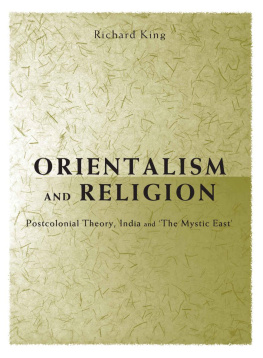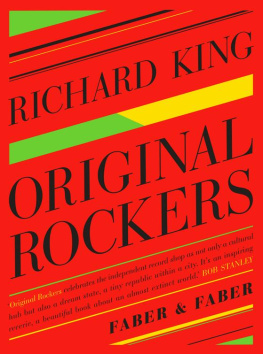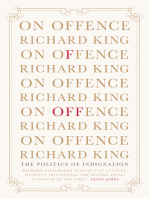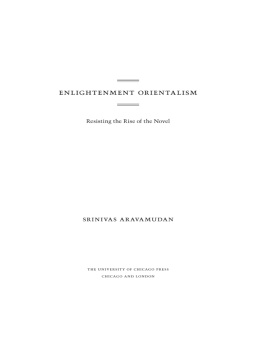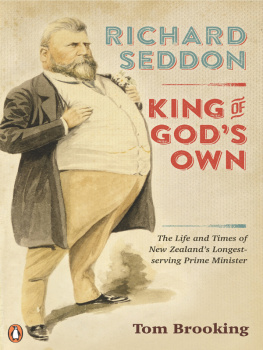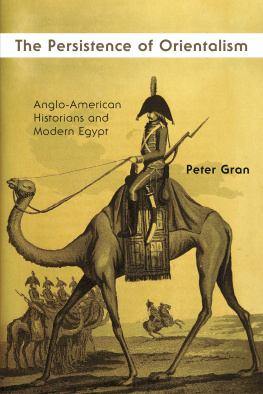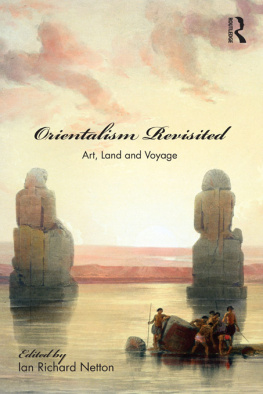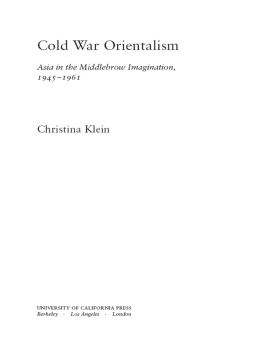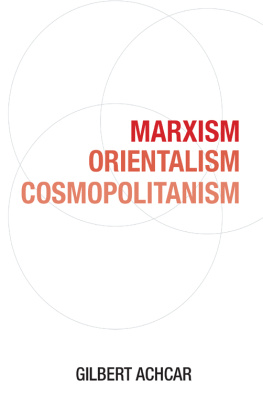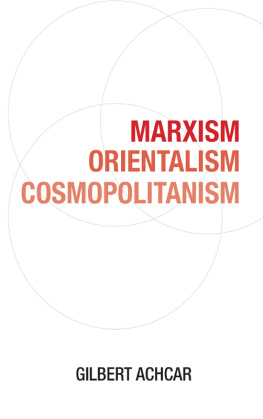Richard King - Orientalism and Religion
Here you can read online Richard King - Orientalism and Religion full text of the book (entire story) in english for free. Download pdf and epub, get meaning, cover and reviews about this ebook. year: 2013, publisher: Taylor and Francis, genre: Religion. Description of the work, (preface) as well as reviews are available. Best literature library LitArk.com created for fans of good reading and offers a wide selection of genres:
Romance novel
Science fiction
Adventure
Detective
Science
History
Home and family
Prose
Art
Politics
Computer
Non-fiction
Religion
Business
Children
Humor
Choose a favorite category and find really read worthwhile books. Enjoy immersion in the world of imagination, feel the emotions of the characters or learn something new for yourself, make an fascinating discovery.
- Book:Orientalism and Religion
- Author:
- Publisher:Taylor and Francis
- Genre:
- Year:2013
- Rating:4 / 5
- Favourites:Add to favourites
- Your mark:
- 80
- 1
- 2
- 3
- 4
- 5
Orientalism and Religion: summary, description and annotation
We offer to read an annotation, description, summary or preface (depends on what the author of the book "Orientalism and Religion" wrote himself). If you haven't found the necessary information about the book — write in the comments, we will try to find it.
Orientalism and Religion — read online for free the complete book (whole text) full work
Below is the text of the book, divided by pages. System saving the place of the last page read, allows you to conveniently read the book "Orientalism and Religion" online for free, without having to search again every time where you left off. Put a bookmark, and you can go to the page where you finished reading at any time.
Font size:
Interval:
Bookmark:
Drawing on a host of contemporary social and critical theorists, Richard King has written an impressive and truly cross-disciplinary study that tackles head-on some of the fields most deeply ingrained vet troublesome presumptions. Orientalism and Religion is therefore a crash course in intellectual self-defence, a primer for those who have long suspected that there is a powerful yet largely undetected politics moving within rhetorics concerning such things as unmediated experiences of the real. In recommending that religion he understood as an aspect of culture and, moreover, that the academic study of religion be redcscribed along the lines of cultural studies, King joins a growing number of intellectuals who have stepped forward to accept the challenge of modernist roots. Accordingly, Orientalism and Religion promises to help set the terms for future debates on the status, methods, and theories of the study of religion.
Russell T. McCutcheon, Southwest Missouri State University
Richard Kings Orientalism and Religion provides an insightful and provocative contribution to a recent series of studies that can be best characterized as colonial discourse analysis. It is not so much about India and Europe as it is about Western fantasies and constructions about India and Europe. The book rightly calls for a new critical self-refiexivity and a much more sophisticated new comparativism.
Gerald J. Larson, Indiana University
This is an important book. The main theme, the othering of the East, is highly significant and original, painstakingly documented, and with major implications for western scholarship.
Grace Janteen, University of Manchester
Richard King is Reader in Religious Studies at the University of Stirling. He is the author of Early Advaita Vednla and Buddhism and Indian Philosophy: An Introduction to Hindu and Buddhist Thought.
Postcolonial theory, India and the mystic East
Richard King

First published 1999 by Routledge
2 Park Square, Milton Park, Abingdon, Oxon, OX14 4RN
Simultaneously published in the USA and Canada
by Routledge
270 Madison Avenue, New York, NY 10016
Reprinted 2002, 2003, 2004, 2005, 2006, 2007, 2008 (twice), 2009
Routledge is an imprint of the Taylor & Francis Group, an informa business
1999 Richard King
Typeset in Times by Routledge
Printed and bound in Great Britain by the MPG Books Group
All rights reserved. No part of this book may be reprinted or reproduced or utilised in any form or by any electronic, mechanical, or other means, now known or hereafter invented, including photocopying and recording, or in any information storage or retrieval system, without permission in writing from the publishers.
British Library Cataloguing in Publication Data
A catalogue record for this book is available from the British Library
Library of Congress Cataloging in Publication Data
King, Richard
Orientalism and religion: post-colonial theory, India and the mystic
East/Richard King.
p. cm.
Includes bibliographical reference and index.
. India-Religion-Study and teaching. 2. Religions-Study and teaching. 3. Philosophy, India-Study and teaching. I. Tide.
BL2203.K56 1999 98-46343
200'.7-dc21 CIP
ISBN 10: 0-415-20257-4 (hbk)
ISBN 10: 0-415-20258-2 (pbk)
ISBN 13: 978-0-415-20257-2 (hbk)
ISBN 13: 978-0-415-20258-9 (pbk)
DOI: 10.4324/9780203006085
For Juli, my very own Fire CF
I am indebted to the University of Stirling for two periods of sabbatical leave, in Spring 1994 and Autumn 1997 and to the British Academy for financing an additional period of research leave in Spring 1998 which allowed me to complete this work. I would particularly like to thank my colleagues in the Department of Religious Studies at the University of Stirling in Scotland, for taking on my administrative and teaching responsibilities during this time, especially captain at the helm Keith Whitelam for making it so.
I would like to express my gratitude to Grace Jantzen for her constructive comments and criticism of the work as a whole, John Hinnells for his ongoing encouragement and support of my work and Adrian Driscoll, Anna Gerber and the rest of the team at Routledge for the efficiency and care taken in all stages in the production of this monograph. Mention should also be made of my sister Mary, who, along with Ber, Cat (Tinie) and Steph, provided a safe haven from my work in Den Haag. Thanks also to my friend, colleague and neighbour Jeremy Carrette for many enjoyable hours of intellectual (and not so intellectual) discussion, but most of all for his friendship. I am most indebted, however, to Juli, my partner, best friend and (now) Acupuncturist, for her love, understanding and general joie de vivre.
contain material that also appears in Numen (1999) as Orientalism and the modern myth of Hinduism. A work such as this inevitably reflects a multitude of intellectual influences. I trust that these are mostly self-evident from the text itself. It has become a standard academic convention to attribute the positive aspects of one's work (or as Buddhists might put it, to transfer one's merit) to others and to proclaim all errors as one's own. I will not differ in this respect.
Changing the subject
DOI: 10.4324/9780203006085-1
This work can be located within the history of ideas and is an examination of a constellation of categories surrounding the cultural symbolic of the mystic East in modern Western consciousness. The history of ideas is often distinguished from philosophy on the grounds that the latter involves an engagement and evaluation of ideas rather than a non-committal examination of concepts within their own cultural and historical context. However, I wish to argue that both philosophy and the history of ideas should take more seriously not only the social location of the concepts under examination but also their involvement in a wider cultural field of power relations, or what has become known as the politics of knowledge. In particular, I wish to argue for an awareness of the mutual imbrication of religion, culture and power as categories. This is not to say that religion and culture can be reduced to a set of power relations but rather that religion and culture are the field in which power relations operate. Materialist and cultural analyses are not mutually exclusive, either/or explanations. Power is not mere material conditions without cultural trace since there is no power in the abstract power, indeed, is constituted in particular cultural forms. Equally, cultural forms are embedded in a field of power relations. What is required, therefore, is an approach that avoids materialist reductionism (which denies culture) or culturalist reductionism (which denies power) with a renewed emphasis upon the mutual imbrication of the two. My stance, therefore, is rather close to that of Nicholas Dirks in attempting to reintroduce power, hegemony and history into studies of culturally-constructed structures of thought without falling into the opposite extreme of reducing everything to a discussion of power relations. The mistake is in separating the two in the first place.
The form and relations of power in southern India efface social scientific distinctions of materialist etics from culturalist emics, for even an analysis of ritual action and language suggests the complex and conjectural foundations of hierarchical relations.
Font size:
Interval:
Bookmark:
Similar books «Orientalism and Religion»
Look at similar books to Orientalism and Religion. We have selected literature similar in name and meaning in the hope of providing readers with more options to find new, interesting, not yet read works.
Discussion, reviews of the book Orientalism and Religion and just readers' own opinions. Leave your comments, write what you think about the work, its meaning or the main characters. Specify what exactly you liked and what you didn't like, and why you think so.

